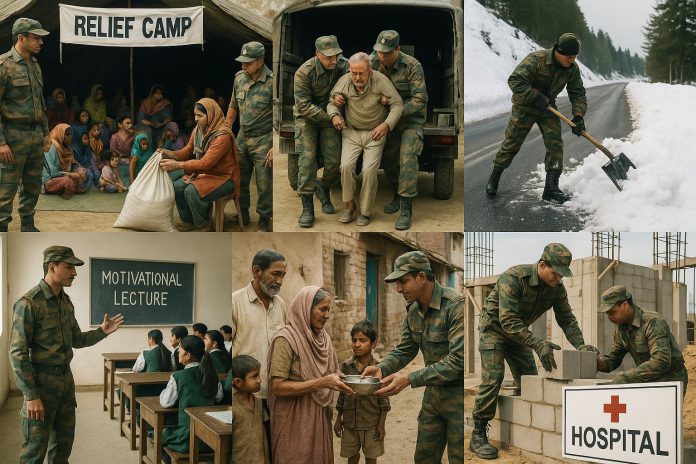Dr Ashfaq Lone
Karnah, Kupwara, Jun 21: Nestled deep in the remote frontier of north Kashmir’s Kupwara district, the Karnah Valley has long been known for its isolation, harsh winters, and treacherous terrain. But amid the challenges, the Indian Army’s Shakti Vijay Brigade has emerged as a constant pillar of strength, not only protecting the borders but also shaping the lives of the people through tireless efforts in development, employment generation, rescue operations, and community outreach.
One of the most impactful initiatives undertaken by the Indian Army in Karnah is Operation Sadhbhavana. This long-running humanitarian program has brought a wave of change to the valley, focusing on empowering the youth through education and vocational training. Under this initiative, the Army has established and supported a variety of skilling centers offering courses such as computer diplomas, front office associate training, baking and culinary classes, tailoring, and even spoken English. These programs are designed to make the youth of Karnah self-reliant, confident, and capable of finding employment opportunities not only within the region but across the country.
Given the region’s heavy snowfall and lack of private sector opportunities, the Army also provides vital seasonal employment by hiring local porters. These porters play a crucial role in logistics and support operations, especially in the winter months when the area is cut off due to snow. This initiative provides much-needed income for hundreds of households, proving to be a lifeline for many in the valley.
Infrastructural improvements have also been a focus of the Shakti Vijay Brigade’s efforts. To ease the movement of civilians and reduce delays during travel, especially through the difficult stretch of Sadhna Top on the Karnah-Kupwara Highway, the Army has installed a dedicated scanning facility. This facility has significantly reduced waiting time and improved travel efficiency, especially during harsh weather or when movement of supplies and emergency services is crucial.
Recognizing the cultural and economic importance of nomadic tribal communities like the Gujjars and Bakarwals, the Army has taken steps to assist their seasonal migration. Traditional routes have been diverted and improved for safer movement of their livestock, and unique identity cards have been issued for their safety and identification. These efforts have not only safeguarded their seasonal passage but also extended a sense of security and dignity to these communities.
Perhaps most importantly, the Indian Army’s Shakti Vijay Brigade has become the first and most reliable responder during every natural or anthropogenic disaster in the Karnah Valley. Whether it is a snow avalanche, flash flood, fire incident, or landslide, the Army is always on the ground with immediate rescue and relief operations. Their quick response teams, medical assistance, and winter stocking measures have saved countless lives over the years. In emergencies where no civilian agency can reach in time, it is the Army that carries the injured on foot, clears the roads, sets up emergency shelters, and even restores communication lines.
In Karnah, the soldier is more than a guardian of borders — he is a friend, a teacher, a rescuer, and a builder of futures. The Shakti Vijay Brigade’s tireless work in this remote region has not only brought security but has also sown the seeds of long-term development and hope. Through their selfless service, the Army continues to uplift Karnah, ensuring that even the most remote corners of India feel the pulse of progress and compassion.




